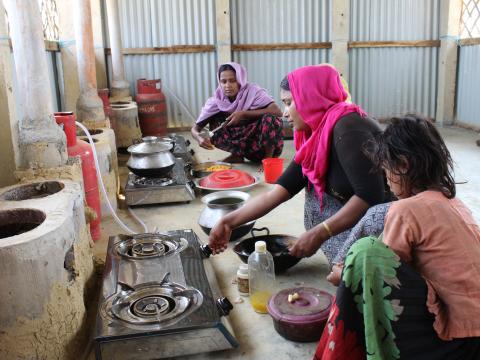42 new World Vision community kitchens help free children from firewood collecting

Ummah, 8, is happy that she no longer has to spend her days collecting firewood, thanks to the new World Vision community kitchen that recently opened near her house.
“It’s a long way. We had to walk at least three hours to reach the forest where we collected firewood,” says Ummah. “Sometimes thorns jabbed our hands and feet. After gathering the firewood, we had to carry the loads back. By the time we reached home, our bodies ached.”
Ummah is one of thousands of Rohingya girls and boys who must collect firewood daily so their families can cook. Their parents worry about them going to the forest because it is far and it’s risky for children. But it’s the only option they have. Without money to purchase firewood or other sources of fuel, they are forced to send their children to the forest.
According to a recent report, the Rohingya refugees consume 2,200 metric tons of firewood every day for cooking fuel. They daily remove 700 metric tons of wood —the equivalent of around four football fields of trees— from local forests. This has severely degraded approximately 5,000 acres of forest, and is a point of escalating conflict between refugees and neighbouring landowners.
“People harass us when we go to cut wood in villages outside the camp,” says Jafar, a refugee community leader. “There is no forest nearby anymore. If a man goes in the morning for firewood, he can return in the afternoon.”
To address this growing environmental problem, World Vision constructed 42 community kitchens in seven camps, funded by the UK’s Disasters Emergency Committee (DEC) and the New Zealand Ministry of Foreign Affairs and Trade (MFAT). Each kitchen is equipped with five two-burner stoves fuelled by propane gas. Around 12-13 women can prepare food during one of two shifts, with up to 1,100 families using the kitchens daily.
Ummah’s mother, Rahima, 25, cooks daily meals for her five children at one of 22 community kitchens funded by New Zealand-MFAT.
“The kitchen has saved us a lot of worry. Before we struggled a lot just to cook our meals,” says Rahima. “My small children had to go to the forest to collect firewood. We burned plastic, sticks from our roofs and paper—whatever we would get—because getting fuel was such a challenge.”
Ummah is happy to be freed from collecting firewood. “Now I don’t need to suffer because of collecting firewood. We can cook here in the kitchen. And I can go to school (a child-friendly space run by another NGO) regularly.”
In another camp, Senwara, 35, a refugee mother of four children, cooks her meal at one of the 20 community kitchens funded by UK’s Disasters Emergency Committee (DEC).
“It’s good that we can cook here now,” said Senwara, stirring a pot of lentils and rice. “We can cook our food properly on the gas stoves.”
While her pot simmers, Senwara chats with her neighbours. “In Myanmar, we did not cook together like this. We meet here and gossip about our lives,” says Senwara. “There are many families who still need a kitchen in their area. They struggle a lot just to eat.”
The kitchens have other social benefits, too. “Besides being a place to cook, the kitchens are learning centres,” says project manager Prodip Kumar Suter. “The women learn about good nutrition and healthy food preparation, and personal and household hygiene.”
Story by: Himaloy Joseph Mree

